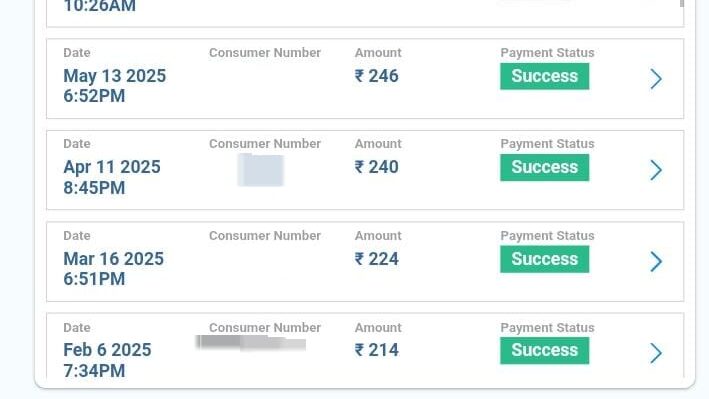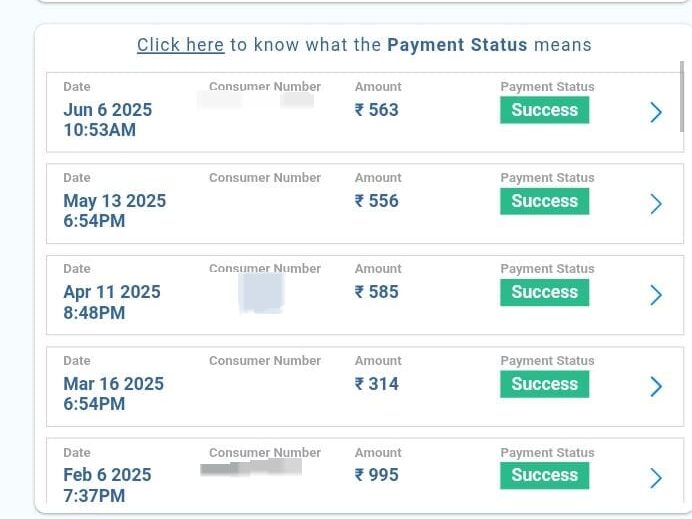Sri Vijaya Puram, July 7: Concerns over billing transparency have resurfaced after a Shadipur-based household reported receiving inflated electricity bills despite having their power supply completely turned off for over two months. The case has raised questions about the functioning of the Urja Pay billing system used by the Electricity Department of the Andaman and Nicobar Administration, particularly regarding backend calculations and complaint resolution.

Records accessed by The Wave Andaman from Urja Pay show a mismatch between the reported power consumption and billing amounts. In February-June 2025, the household was billed ₹215 and ₹260, even though their Miniature Circuit Breaker (MCB) remained off throughout the period. Past transaction records indicate regular payments by the consumer, and the system previously reflected no significant dues. The sudden rise in charges despite zero usage has baffled the consumer and triggered wider concerns about metering accuracy.

The inconsistency is not limited to a single billing cycle. Between February and June 2025, the consumer made regular payments ranging from ₹214 to ₹995. However, bills issued during this period fluctuated with no clear basis. For instance, the March 2025 bill was ₹314, which increased to ₹585 in April and ₹556 in May. Then, despite no increase in consumption, the July charge spiked to ₹2,426. Residents argue that such erratic billing raises doubts over the credibility of metering systems or backend processing logic.
Further complicating matters, complaints about meter inactivity date back to March 10, 2025, when the consumer formally notified the department that the meter had not been operational. Yet, the October 2024 bill was charged above the base amount. Although marked closed on the complaint portal, the issue remained unresolved with no official communication or explanation from the department.
Multiple grievance entries have been logged on the Urja Pay platform without any action. In a complaint filed on June 12, 2025, the consumer stated that no response had been received, raising concerns about whether complaints are even reviewed. Another complaint filed on June 6 mentioned the meter being inactive for two months, yet billing continued as if regular usage had occurred. The consumer reported these discrepancies, but the system continued to reflect dues, compounding their confusion and frustration.
In-person visits to the local electricity office in Shadipur reportedly yielded no resolution either. The consumer recounted interactions with staff that were dismissive, often involving blame-shifting without any formal record checks or written responses. The lack of accountability in both the digital and physical interfaces has left the household without a path to resolution.
While the administration has emphasised digital governance and streamlined citizen services, this case reflects a breakdown in support mechanisms. The Urja Pay system enables online payments and complaint submissions, but the lack of feedback or error correction has raised questions about its effectiveness.
The household’s case also points to a wider trend, with other residents across Sri Vijaya Puram and adjoining areas reporting similar issues related to billing irregularities, indifferent staff responses, and a complaint system that appears non-functional beyond data logging.
In previous instances reported by The Wave Andaman, residents have expressed growing disillusionment with the Electricity Department’s failure to address even basic billing anomalies. Despite escalating concerns, no official clarification has been issued, nor have any systemic corrections been made to resolve ongoing complaints.
The recurring discrepancies, coupled with the department’s silence, have fueled a crisis of confidence among consumers. At a time when public utilities are expected to uphold transparency and accountability, the Electricity Department’s apparent inaction has only deepened public dissatisfaction.
As digital infrastructure expands, residents argue that it must be matched by responsive governance. For now, the affected household remains burdened with unexplained dues, waiting not just for billing corrections, but also for a system that listens.





